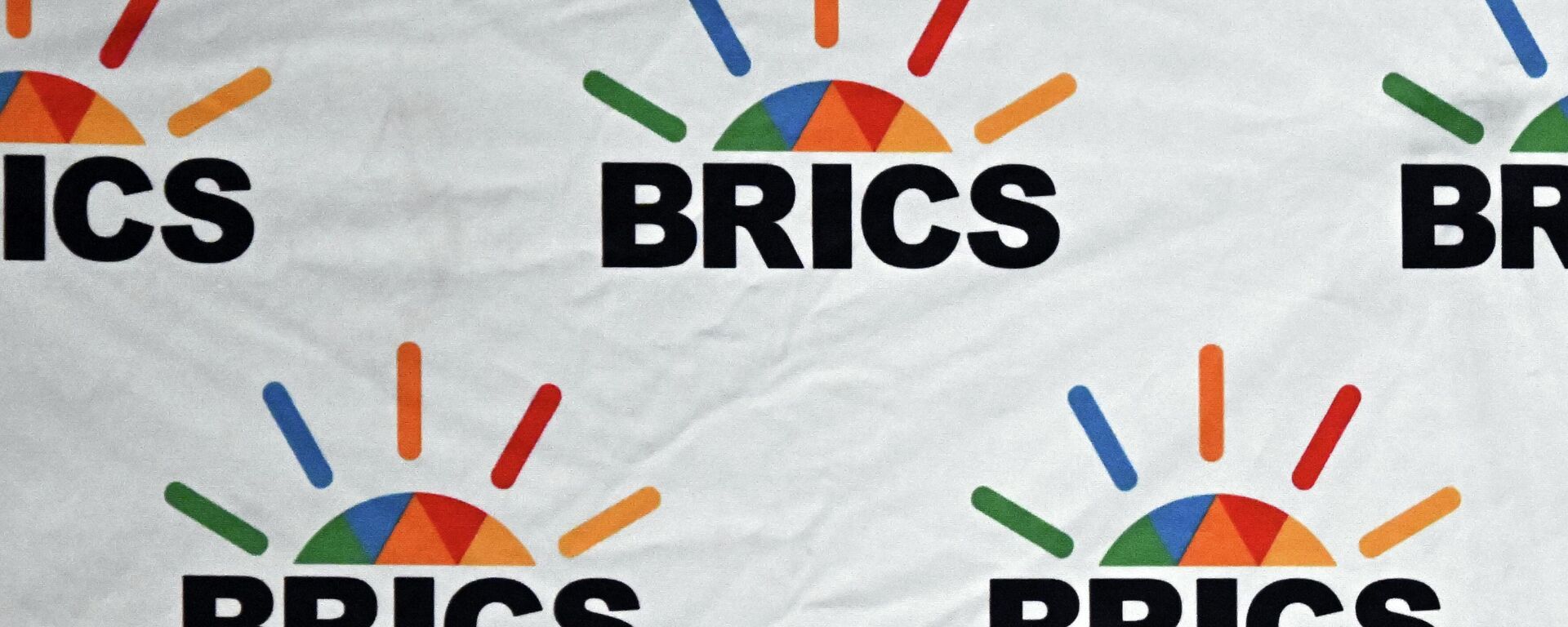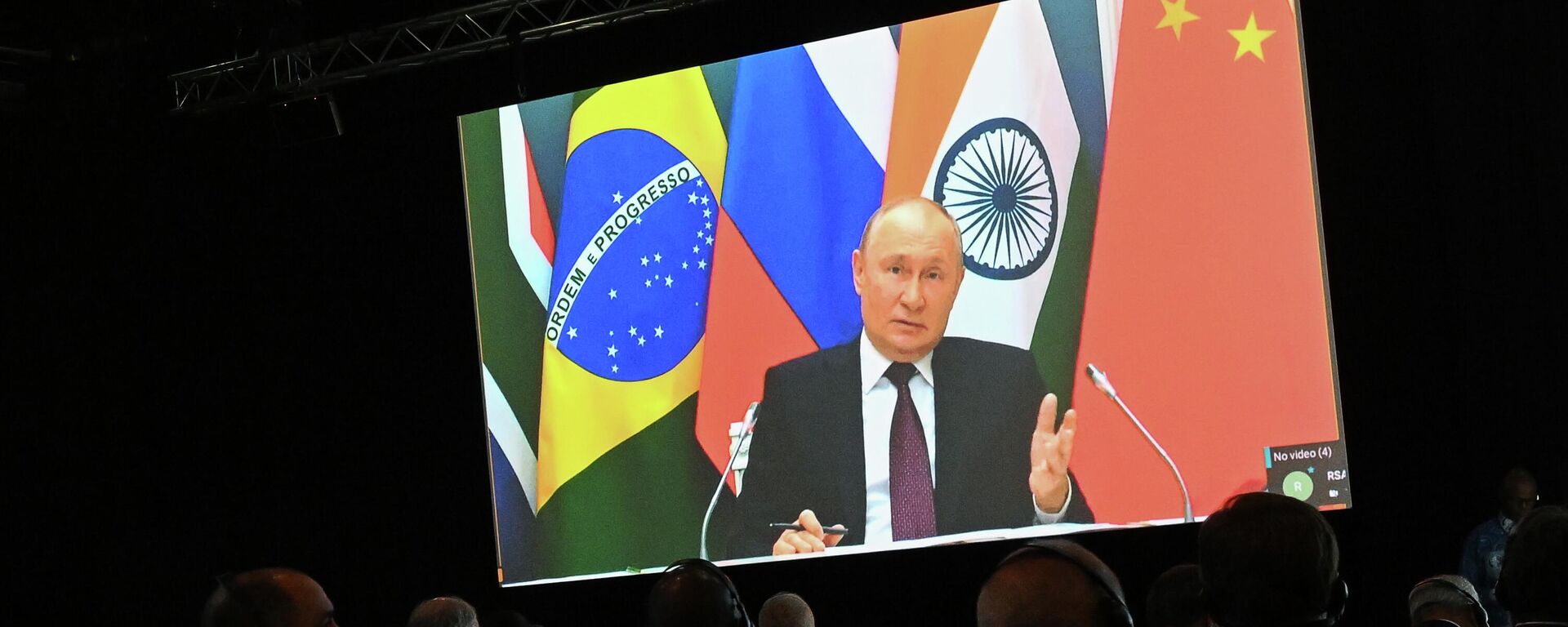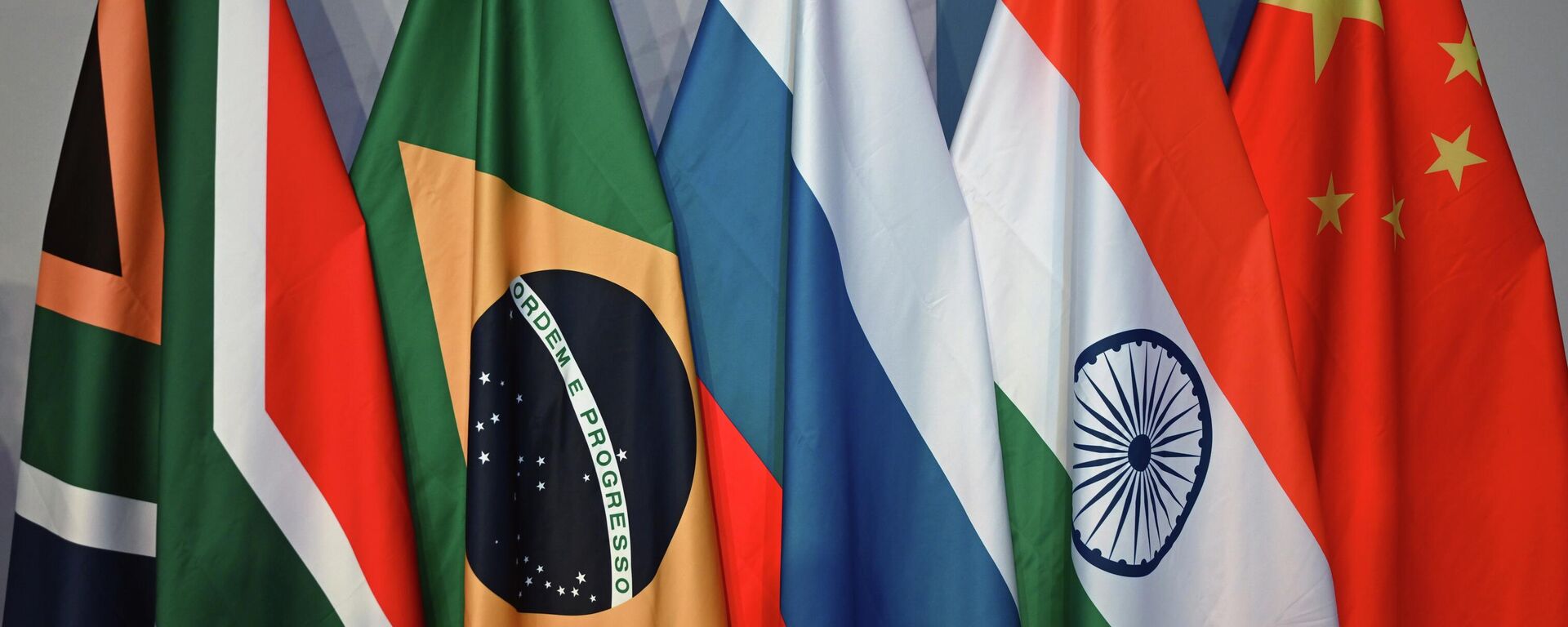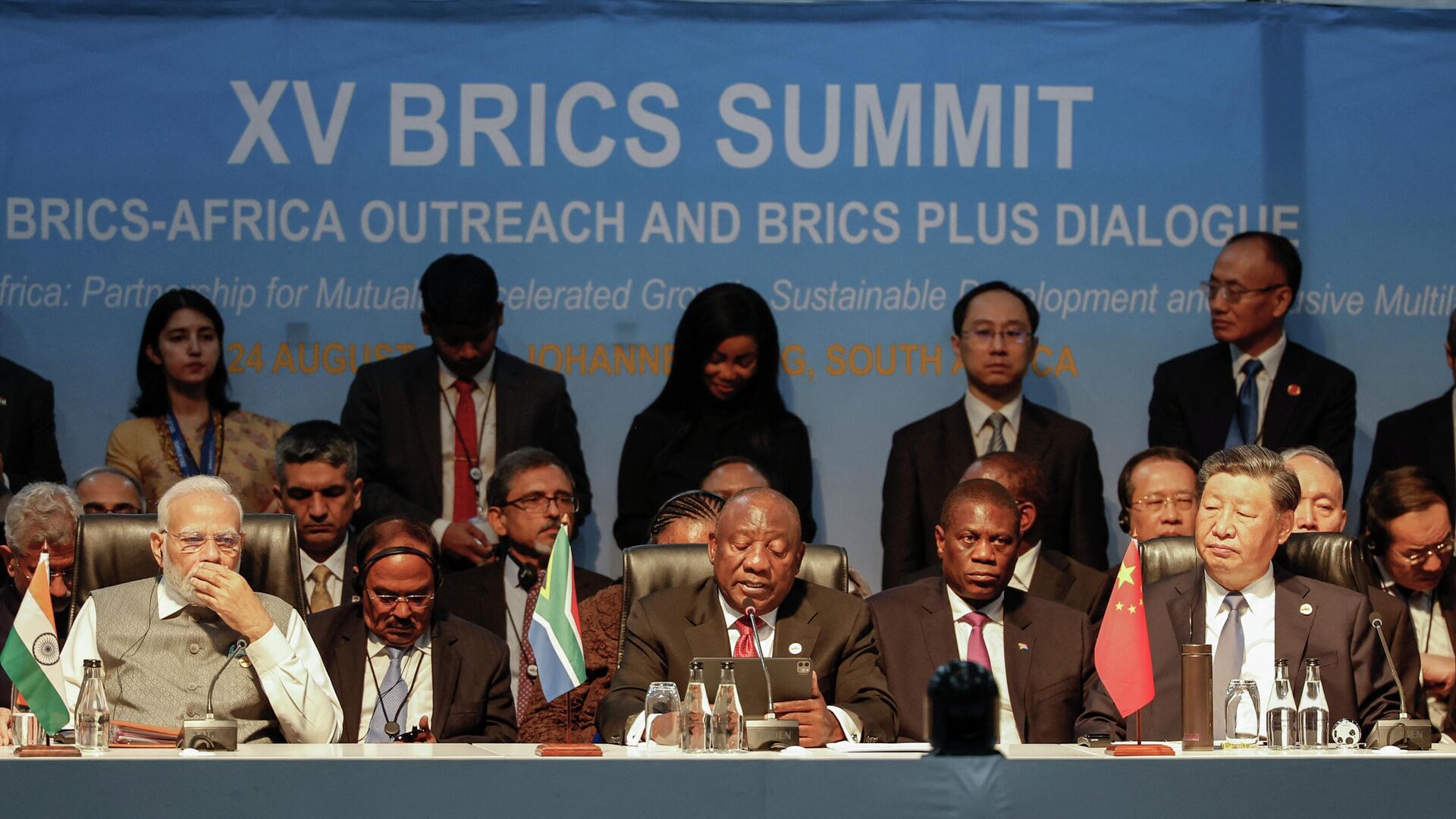https://sputnikglobe.com/20230824/brics-expansion-main-catalyst-of-new-world-order-marked-by-end-of-petrodollar-1112847948.html
BRICS Expansion ‘Main Catalyst' of New World Order Marked by 'End of Petrodollar'
BRICS Expansion ‘Main Catalyst' of New World Order Marked by 'End of Petrodollar'
Sputnik International
Integration of new members into BRICS will facilitate the advent of a new world order, marked by the end of the petrodollar’s “yoke”, Michael Goddard told Sputnik.
2023-08-24T11:45+0000
2023-08-24T11:45+0000
2023-08-24T12:44+0000
brics summit 2023
brics bank
brics
analysis
cyril ramaphosa
naledi pandor
new development bank (ndb)
south africa
https://cdn1.img.sputnikglobe.com/img/07e7/08/18/1112846077_0:160:3072:1888_1920x0_80_0_0_c577a09ced90ca59df0be988b817c9d3.jpg
Integration of new members into BRICS will facilitate the advent of a new world order, marked by the end of the petrodollar’s “yoke,” Michael Goddard, president of the Netley Group, told Sputnik.Earlier in the day, Argentina, Egypt, Ethiopia, Iran, Saudi Arabia, and the United Arab Emirates were invited to become full members of BRICS. “The membership will take effect from January 1, 2024," South African President Cyril Ramaphosa said on Thursday at the BRICS Summit in South Africa.With two of the new countries located in the Middle East, two in Africa, and the rest - previously neighbors of the association of five nations that incorporates Brazil, Russia, India, China, and South Africa, this expansion is a hugely significant event in the world history, said Goddard.He added that in his opinion, the “Saudis will begin to price more and more oil only in local currencies, in yuan, and whatever.”Integration of the six abovementioned countries in the BRICS group is “relevant on both economic and geopolitical grounds, for at least two reasons," according to Sergio Rossi, professor of macroeconomics and monetary economics at the University of Fribourg, Switzerland.‘Breaking the Yoke’While BRICS is yet to present criteria for new members' inclusion, the six aforementioned countries were added to the bloc after the group had agreed on the issue of enlargement, and adopted a document outlining its principles, as South African Foreign Minister Naledi Pandor previously clarified. “We have agreed on the matter of expansion. We have a document that we have adopted that sets out the guidelines and principles, processes for considering countries that wish to become members of the BRICS,” Pandor said on Ubuntu Radio, a station run by South Africa’s Foreign Ministry. About two dozen other countries have expressed their interest in joining the club, South Africa's BRICS Sherpa Anil Sooklal said earlier in the month.The current expansion decision is, firstly, “a clear signal to the United States and the Western bloc as a whole that globalization does not rely only on the US ‘soft power’ and dollar dominance, as there will be at least two opposing blocs of countries, namely, the ‘Global North’ and the ‘Global South,’” said Sergio Rossi.The macroeconomics expert continued:Indeed, the momentous expansion decision is “just the beginning of the breaking of the yoke of America's basic oppression of countries like Iran,” Michael Goddard said, because it means that “you'll have a new, reliable, not only financial network, but network of the ability to trade goods and services or whatever else.” With BRICS accounting for 37 percent of world's GDP and almost half of the world's population, the expansion is fraught with both opportunities and challenges. And its “going to be a gigantic fight,” the resident of the Netley Group warned.Sergio Rossi, agreed that as the expansion of the group brings with it an increase in the "size of GDP and population across the BRICS," it will thereby create "more business opportunities, both within and across the BRICS countries’ borders." Rossi underscored at this point the importance of expanding settlements in national currencies for BRICS members, and enhancing cooperation between banks. At the group's summit in Johannesburg, South African President Cyril Ramaphosa expressed concerns about the increasing weaponization of the global financial system and payment mechanisms for geopolitical purposes, saying:"We are concerned that global financial and payment systems are increasingly being used as instruments of geopolitical contestation. Global economic recovery relies on predictable global payment systems and the smooth operation of banking, supply chains, trade, tourism, as well as financial flows." The South African president noted that BRICS leaders would continue to consider "practical measures" to facilitate trade and investment flows through "the increased use of the local currencies." BRICS' New Development Bank is leading the way in this area, said Ramaphosa, demonstrating ability to mobilize resources for infrastructure and sustainable development in emerging economies ever since its establishment in 2015.Looking ahead, the beginning of the new world order currently taking shape “will make the world a fairer and better place, and will make people able to make business decisions and not worry about politics," suggested Michael Goddard. He voiced his “deep belief” that Russia was "the best placed country in economy to take advantage of this."
https://sputnikglobe.com/20230824/argentina-iran-saudi-arabia-egypt-uae-and-ethiopia-get-brics-membership-1112840923.html
https://sputnikglobe.com/20230824/brics-have-opponents--countries-of-golden-billion---putin-1112844468.html
https://sputnikglobe.com/20230823/brics-offers-alternative-model-as-us-hegemony-fades-1112825485.html
south africa
Sputnik International
feedback@sputniknews.com
+74956456601
MIA „Rosiya Segodnya“
2023
News
en_EN
Sputnik International
feedback@sputniknews.com
+74956456601
MIA „Rosiya Segodnya“
Sputnik International
feedback@sputniknews.com
+74956456601
MIA „Rosiya Segodnya“
brics expansion, new members into brics, new world order, end of petrodollar, de-dollarization, yuan, dedollarisation, dedollarization
brics expansion, new members into brics, new world order, end of petrodollar, de-dollarization, yuan, dedollarisation, dedollarization
BRICS Expansion ‘Main Catalyst' of New World Order Marked by 'End of Petrodollar'
11:45 GMT 24.08.2023 (Updated: 12:44 GMT 24.08.2023) BRICS leaders have decided to invite Argentina, Egypt, Iran, Ethiopia, the UAE, and Saudi Arabia to join the group, South African President Cyril Ramaphosa announced on Thursday at the Johannesburg-hosted summit, with the admission of the new members just the first phase of the expansion process.
Integration of
new members into BRICS will facilitate the advent of a new world order, marked by the end of the petrodollar’s “yoke,”
Michael Goddard, president of the Netley Group, told
Sputnik.
Earlier in the day, Argentina, Egypt, Ethiopia, Iran, Saudi Arabia, and the United Arab Emirates were invited to become full members of BRICS. “
The membership will take effect from January 1, 2024," South African President Cyril Ramaphosa said on Thursday at the
BRICS Summit in South Africa.
With two of the new countries located in the Middle East, two in Africa, and the rest - previously neighbors of the association of five nations that incorporates Brazil, Russia, India, China, and South Africa, this expansion is a hugely significant event in the world history, said Goddard.
“Obviously Africa is emerging, and that's very important. But the main news is Saudi [Arabia] and the UAE. Basically, this will change the balance of power in the world, as it's the beginning of the end of the petrodollar. And this is the main catalyst to bring about the new world order,” Michael Goddard underscored.
He added that in his opinion, the “Saudis will begin to price more and more oil only in local currencies, in yuan, and whatever.”
Integration of the six abovementioned countries in the BRICS group is “relevant on both economic and geopolitical grounds, for at least two reasons," according to Sergio Rossi, professor of macroeconomics and monetary economics at the University of Fribourg, Switzerland.
“On the one hand, these countries export some key goods much demanded in the global supply chain, which could thereby contribute to economic growth across the global economy, particularly with regard to the so-called ‘Global South’ of the world. On the other hand, their own contribution to the global economy could accelerate the de-dollarization of this part of the world, with all the ensuing geopolitical consequences that could actually accelerate the creation of a multipolar economic system at global level," Rossi told Sputnik.

24 August 2023, 07:49 GMT
While BRICS is yet to present criteria for new members' inclusion, the six aforementioned countries were added to the bloc after the group had agreed on the
issue of enlargement, and adopted a document outlining its principles, as South African Foreign Minister Naledi Pandor previously clarified.
“We have agreed on the matter of expansion. We have a document that we have adopted that sets out the guidelines and principles, processes for considering countries that wish to become members of the BRICS,” Pandor said on Ubuntu Radio, a station run by South Africa’s Foreign Ministry. About two dozen other countries have expressed their interest in joining the club, South Africa's BRICS Sherpa Anil Sooklal said earlier in the month.
The current expansion decision is, firstly, “a clear signal to the United States and the Western bloc as a whole that globalization does not rely only on the US ‘soft power’ and dollar dominance, as there will be at least two opposing blocs of countries, namely, the ‘Global North’ and the ‘Global South,’” said Sergio Rossi.
The macroeconomics expert continued:
“Secondly, the criteria to be presented could slow down the BRICS enlargement process, as many would-be member countries probably will not be able to respect all of these criteria before long. Including these six countries now avoids this problem and gives a signal to the global economy, particularly to Western countries, that globalization is going to change on structural grounds.”
Indeed, the momentous
expansion decision is “
just the beginning of the breaking of the yoke of America's basic oppression of countries like Iran,”
Michael Goddard said, because it means that “
you'll have a new, reliable, not only financial network, but network of the ability to trade goods and services or whatever else.” With BRICS accounting for 37 percent of world's GDP and almost half of the world's population, the expansion is fraught with both opportunities and challenges. And its “
going to be a gigantic fight,” the resident of the Netley Group warned.
“… The Americans and the West are not going to want to let go of the dollar's dominance, firstly, and secondly, their ability to control the world in many ways. And so in setting this up and making this happen, it's going to be a huge challenge and there's going to be a lot of obstacles. But at the end of the day, I believe that this is a process that's unstoppable and it's gaining momentum already. De-dollarization is happening already, and I think it's happening faster than most people believe, and what you would hear from the West," Michael Goddard warned.

24 August 2023, 09:09 GMT
Sergio Rossi, agreed that as the expansion of the group brings with it an increase in the "size of GDP and population across the BRICS," it will thereby create "more business opportunities, both within and across the BRICS countries’ borders." Rossi underscored at this point the importance of
expanding settlements in national currencies for BRICS members, and enhancing cooperation between banks.
"This is so much so if the common international currency announced recently will be issued by a BRICS supranational bank, thereby replacing the US dollar in cross-border payments concerning any BRICS member country. This is the most important challenge these countries will have to address before long, to make sure their own financial systems are less fragile, since any new turmoil affecting US banks or US-based financial institutions will no longer impact on BRICS countries negatively, so that BRICS will become an interesting investment opportunity for all kinds of investors across the global economy,” Sergio Rossi said.
At the group's summit in Johannesburg, South African President Cyril Ramaphosa expressed concerns about the increasing weaponization of the global financial system and payment mechanisms for geopolitical purposes, saying:
"We are concerned that global financial and payment systems are increasingly being used as instruments of geopolitical contestation. Global economic recovery relies on predictable global payment systems and the smooth operation of banking, supply chains, trade, tourism, as well as financial flows."
The South African president noted that BRICS leaders would continue to consider "
practical measures" to facilitate
trade and investment flows through "
the increased use of the local currencies."
BRICS' New Development Bank is leading the way in this area, said Ramaphosa, demonstrating ability to mobilize resources for infrastructure and sustainable development in emerging economies ever since its establishment in 2015.
Looking ahead, the beginning of the new world order currently taking shape “will make the world a fairer and better place, and will make people able to make business decisions and not worry about politics," suggested Michael Goddard. He voiced his “deep belief” that Russia was "the best placed country in economy to take advantage of this."
"Basically, if you look at Russia's fundamentals, plus its clever, well-managed government, being able to escape the Western system and be a part of a new system will help Russia just boom in a way that I think few people see," Michael Goddard concluded.

23 August 2023, 18:27 GMT







